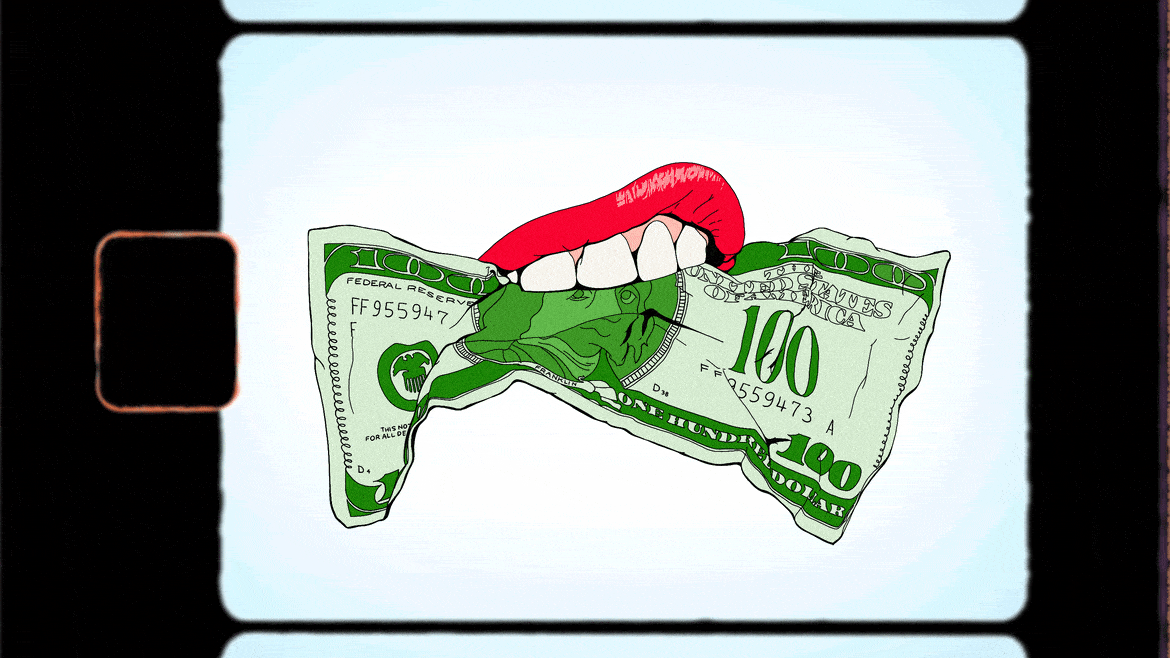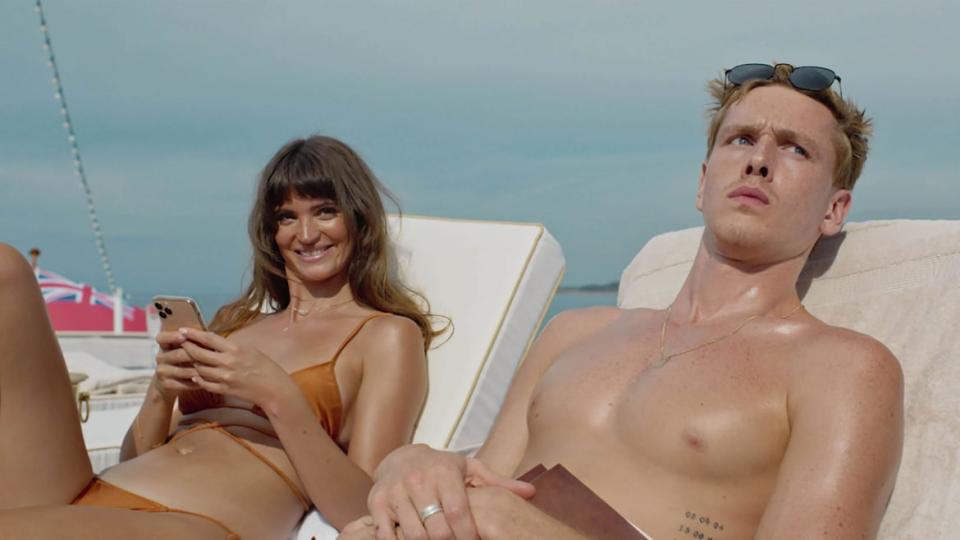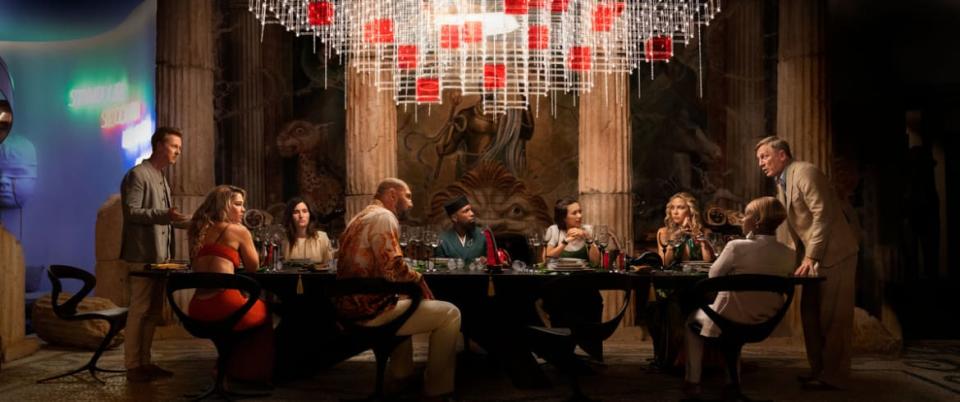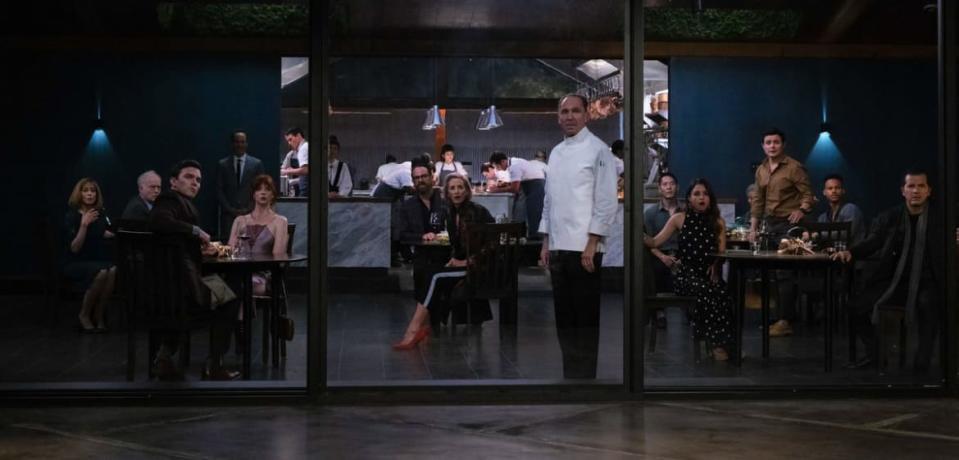Hollywood’s Biggest Fall Movies Are All About ‘Eating the Rich’

So much of pop culture revolves around the voyeuristic compulsion to catch a glimpse of how the other side lives. Culture consumption is more aspirational than ever, as we follow twentysomething influencers whose palatial big-city apartments are paid for by their parents, track multimillion-dollar celebrity home listings on Zillow, and hatefully—yet obsessively—keep up with the Kardashians. Nested deep within this notion there is a darker, anti-establishment (even anti-capitalist) compulsion: We want to see these people suffer.
At this year’s Toronto International Film Festival, amongst historical epics about powerful female warriors and gentle autobiographical dramas about the childhoods of our most beloved directors, were a delightfully mean group of films whose nasty joys came from the deep-seated schadenfreude of watching someone who thinks they’re better than you be brought down to size. And down, and down, and down...
The most overt and obvious comes via the heavy hand of Swedish cringe-comedy maestro Ruben Östlund, whose previous film The Square peeled back the layers of pretension in the art world to reveal the hollow drivel in its center. Even the feature before that, his international breakthrough, Force Majeure, unraveled our notions of heterosexual gender roles while following the breakdown of a well-off family on vacation at a ski resort. His newest film, Triangle of Sadness, is set aboard a luxury yacht, observing gleefully as the boat’s rich passengers debase and embarrass themselves—and are debased and embarrassed in turn by nature itself.

Triangle of Sadness
It begins in the middle of a model casting call, where Carl (Harris Dickinson) and his sharp-cheekboned comrades field questions from a sprightly interviewer who explains to them the concept of “grumpy brands” (high fashion brands whose models are always frowning on the runway and in photographs) and “smiley brands” (cheap clothing retailers with models who hop around joyfully on the covers of their catalogs). The men gamely play along, pouting when he shouts “Balenciaga!” and smiling when he says “H&M!”
Later, Carl and his supermodel girlfriend Yaya (the late Charlbi Dean, luminous in what should have been her breakout role) have a dramatic fight over who ought to foot the bill at an expensive restaurant (she makes more than him, but they can both afford it). Onboard the yacht, Yaya Instagrams her food instead of eating it. A fellow passenger expounds to whoever will listen about how rich and lonely he is. The captain’s dinner, painstakingly arranged by the yacht staff, devolves into a horrifically disgusting madhouse of vomit and other bodily excretions as the passengers succumb to the wild pitch and yaw of the stormy ocean. To be rich is to be utterly, hysterically miserable.
A Brutal Mockery of Influencers and Billionaires Seduces Cannes
After taking to task the old money elites of 2019’s comedy whodunnit Knives Out, director Rian Johnson has his sights set on new money assholes with the Netflix-funded sequel (the first of at least two) Glass Onion: A Knives Out Mystery. Detective Benoit Blanc (Daniel “Foghorn Leghorn” Craig) is accidentally invited to the private island of tech entrepreneur (gag) Miles Bron (Edward Norton), whose murder mystery weekend getaway turns out to be more than just a game among friends. Blanc swiftly discovers that his fellow guests are less than friends and more like hostages, their respective careers—political firebrand, men’s rights YouTuber, socialite on the verge of cancellation—entirely funded by Bron’s money and influence. In other words, everyone’s got a motive.

Glass Onion: A Knives Out Mystery
Like Knives Out, the plotting of Glass Onion is a delightfully convoluted web of secrets and double-bluffs, but unlike its predecessor, this film actually does feature a villain with murderous intentions. Without spoiling any of the good stuff (and there’s plenty of it), the film culminates in an out-and-out rant from Blanc, berating the eventual culprit for their sheer stupidity in planning and executing what should have been the perfect crime. “It’s just DUMB!!” he bellows, clutching at his head in frustration.
You don’t need to be smart to gather the money and power of this film’s rogues gallery; you just need to stumble into the right place at the right time, a leech on the coattails of those who came before you. Blanc, secretly hoping to find a criminal mastermind worthy of his talents, is left disgusted.
Netflix’s ‘Glass Onion’ Is Even More Fun Than ‘Knives Out’
There was perhaps no film at this year’s festival quite as nasty as Mark Mylod's The Menu, a twisty, shocking send-up of luxury restaurant culture, where the wealthy would rather punish themselves by subsisting on high-minded “concepts” instead of consuming the proletarian notion of mere nourishment.
A group of guests, including the skeptical Margot (Anya Taylor-Joy) and her date, enthusiastic foodie Tyler (a simpering Nicholas Hoult), board a ferry to The Hawthorne, a private island restaurant overseen by the intimidating Chef Slowik (Ralph Fiennes), who is known for his creatively abstract and ever-changing menu. Melon is frozen, grated, and turned into teensy Dippin’ Dots of “snow.” A single scallop is set atop an inedible rock dotted with equally inedible greenery taken from the nearby seaside.
The food is not meant to be enjoyed, but examined, experienced. “Do not eat,” Slowik says, his lips curling at the mere presence of the word as it leaves his mouth. “You’ll eat less than you desire and more than you deserve,” he explains to a few guests left hungry and incensed by the “Breadless Bread Plate” course, essentially a plate with dollops of inedible dipping sauces. One of the guests, a haughty restaurant critic (Janet McTeer), waxes poetic as she attempts to play along, throwing out nonsense like “thalassic” and “a biome of culinary ideas” at every new dish.

The Menu
At first, it appears the film will take the classic “us vs. them” approach of previous class-based plots, as Slowik takes Margot aside and demands that she make a choice about whether she belongs with the staff or the doomed guests. But there’s more going on than just that: The film isn’t going to let a chef who serves his guests weird bullshit off that easily. Those who contribute to the upper-class’s bastardization and corruption of joy, turning things meant to be savored into things to be endured, deserve to be punished, too.
Crowing that the emperor has no clothes is nothing new—The Great Gatsby is perhaps the definitive text about money being unable to buy happiness, and even this year we’ve had plenty of movies, like The Lost City, Morbius, and Jurassic World: Dominion, where rich bullies are one-dimensional villains.
‘The Menu’: Eating at a Restaurant Has Never Been More Horrifying
There were more even at this year’s TIFF: In historical drama Corsage, Vicky Krieps plays Empress Elizabeth of Austria, miserable in her gorgeous gowns and beautiful tresses, constantly demanding to know if the people around her find her beautiful. Even Wendell & Wild, a collaborative effort from stop-motion master Henry Selick and comedy duo Keegan-Michael Key and Jordan Peele, has something to say against millionaires actively funding the school-to-prison pipeline.
The difference is in the nasty little desires revealed under the slick layers of Triangle of Sadness, Glass Onion, and The Menu, all of which give in to the dark impulse to watch the people we hate as they’re made to mewl and squirm. The emperor has clothes, plenty of them, a closet full of beautiful garments—but they’re scratchy, and bulky, and heavy, the kind of fabrics that will weigh him down in the water once the rest of us push him from the life raft.
Get the Daily Beast's biggest scoops and scandals delivered right to your inbox. Sign up now.
Stay informed and gain unlimited access to the Daily Beast's unmatched reporting. Subscribe now.

 Yahoo News
Yahoo News 
